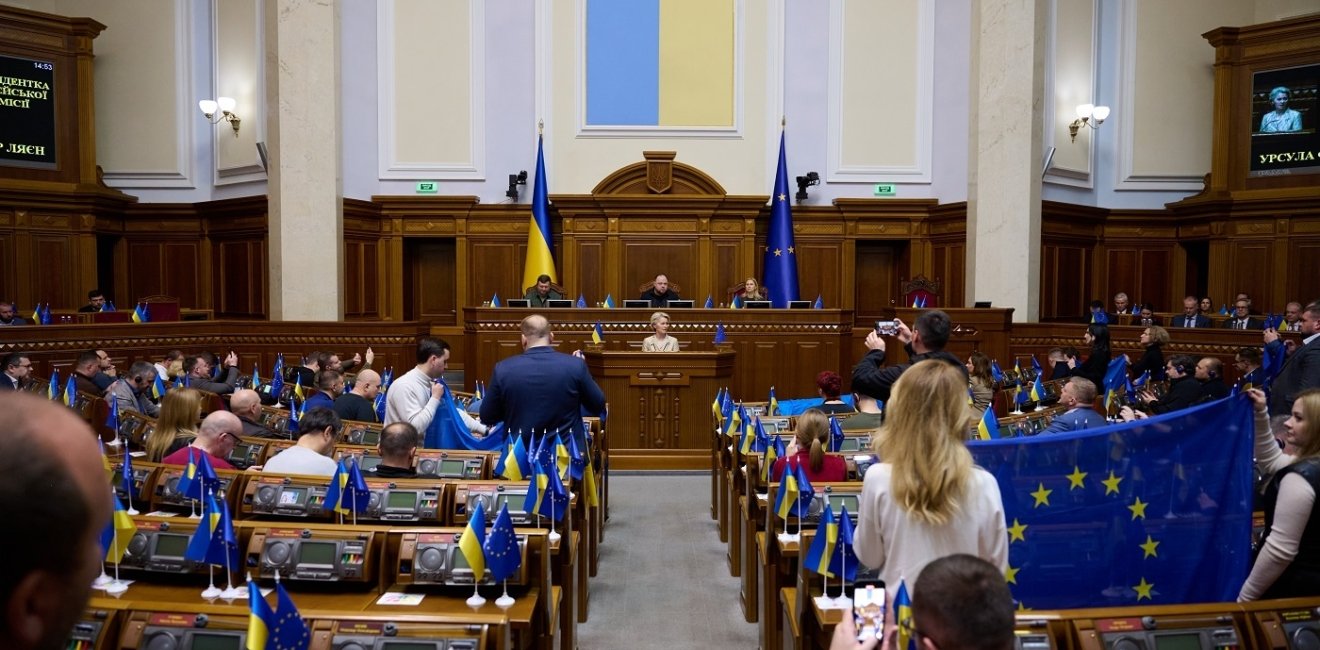
A blog of the Kennan Institute
Since 2022 an external factor has threatened Ukraine’s existence: the full-scale Russian invasion. Now internal factors—namely, the need to renew Ukrainian government’s mandate with the help of democratic elections—have added to Ukraine’s problems.
The essence of the dilemma is as follows. On the one hand, there are legal grounds, popular consent and elites’ agreement that trying to hold elections during wartime could hinder internal stability. On another, external and internal elements could use the exhausted legitimacy of Ukrainian government to accuse democratic Ukraine of formal disrespect of democratic principles. This last factor may become damaging, especially in the attrition phase of the war and in view of the West’s need to respond to the increasing number of wars around the globe.
Constitutional and Administrative Challenges
Ukraine’s constitution holds that the country may not hold parliamentary elections until martial law, in effect since February 24, 2022, is lifted, and for six months thereafter. Several laws would need to be changed in order for presidential elections to be held, which raises its own problems. Even if a legal solution could be found, security, financial, and organizational obstacles to holding free, fair, and representative elections are far more serious.
President Zelensky is not opposed to holding elections but insists they must be held in accordance with the highest standards of democratic elections possible and should not detract from the country’s national defense efforts. Many Ukrainian civic organizations promoting free and fair elections agree on the need to held elections only when the right conditions are present to ensure the integrity of the process and results.
Security is an overarching concern. Almost 20 percent of Ukraine’s territory is occupied. Some settlements are entirely destroyed, while others lack the necessary infrastructure to enable voting. With Russian military forces targeting civilian infrastructure, ensuring the safety of voters, election officials, and observers is simply impossible. President Zelensky has suggested that Western election advocates share in the risks, perhaps by stationing election observers in the trenches to assure the world of the legitimacy of the elections.
Funding the elections is another major problem. According to the Central Election Committee's 2023 calculations, the presidential elections are estimated to cost around $196.7 million, while the parliamentary elections may require approximately $135.9 million. At the same time, Ukraine’s 2024 budget anticipates $43.7 billion in revenues but almost twice that, $82.3 billion, in expenditures, without including election costs. The difference is projected to be covered by international loans and grants.
President Zelensky has stated that he will not hold elections on credit, nor will he “take money from weapons and give it to elections.” Instead, he has suggested that Western countries, especially the United States, that are pressing Ukraine to hold elections could help fund them, in this way sharing the financial risk. With funding and security assured, the country could potentially develop a legal framework to hold elections during wartime, he implied.
That said, Ukraine has learned the hard way that the essence of elections extends beyond the voting day; it encompasses extended campaigns during which society can have honest debates on a range of divisive issues. To preserve national unity for a people facing existential threat is a life-and-death matter. Even antagonistic political forces are reluctant to gain office at the expense of losing the country.
This is why the Ukrainian parliament’s opposition leaders signed a joint statement that both parliamentary and presidential elections should take place after the cessation of the war and the conclusion of martial law. The document indicates a consensus among major political parties regarding the need for an appropriate period of time to prepare for elections and favorable conditions for campaigning and voting.
What Do Voters Think?
For the general population, holding elections under current conditions would be problematic. For example, in a November survey conducted by Kyiv's International Institute of Sociology, over 80 percent of respondents expressed a preference for deferring elections until the war had ended.
The voters’ views on holding elections can be explained by the fact that they understand the challenges of trying to participate in wartime elections. Voter dispersal across Ukraine and outside the country further complicates any electoral effort. With six million internally displaced citizens alone, updating the list of voters would be a daunting task.
The right to vote should also be ensured for over eight million Ukrainian refugees, 60 percent of whom are eligible voters. Currently Poland hosts about 1.6 million refugees and Germany more than a million. In the 2019 Ukrainian parliamentary elections, there were only a small handful of overseas polling places. Moreover, current registration procedures could easily paralyze the work of consulates and embassies. For example, host countries wanting to help Ukraine hold elections by opening polling stations on their own territory might have to change their national laws.
This opinion is supported by over 100 leading election and human rights CSOs, which in a joint statement emphasized the impossibility of holding elections during the active war phase. The statement urges international partners to increase support for Ukraine to finally conclude the war, making democratic elections feasible (at least six months after the end of martial law).
Why It Matters
Ukraine's elections spark debates in the United States and Europe. The absence of elections is now being cited as a reason to withhold aid or to question Ukraine’s democratic status. Observers believe such a stance is a political ploy on the part of members of the U.S. Congress designed to secure changes to immigration policy governing the U.S. border with Mexico.
Ukraine is a democracy at war. It needs to deal with the external threat and then to hold elections. As Olga Ayvazovska, head of the board of the civil network OPORA and an expert in elections, rightly stresses, Ukraine has a record of hewing to a high standard for free and fair elections, but it is impossible to adhere to that standard in wartime. Instead of further entangling in the dilemma, a clear plan is needed. First, Ukraine and West together must resolve the external threat. Second, Ukrainians must elect a new government, continue Ukraine’s democratic development, and start the needed postwar socioeconomic recovery.
The opinions expressed in this article are those solely of the author and do not reflect the views of the Kennan Institute
Author


Kennan Institute
The Kennan Institute is the premier US center for advanced research on Eurasia and the oldest and largest regional program at the Woodrow Wilson International Center for Scholars. The Kennan Institute is committed to improving American understanding of Russia, Ukraine, Central Asia, the South Caucasus, and the surrounding region through research and exchange. Read more

Explore More in Focus Ukraine
Browse Focus Ukraine
Talking to the Dead to Heal the Living

Ukrainian Issue in Polish Elections


